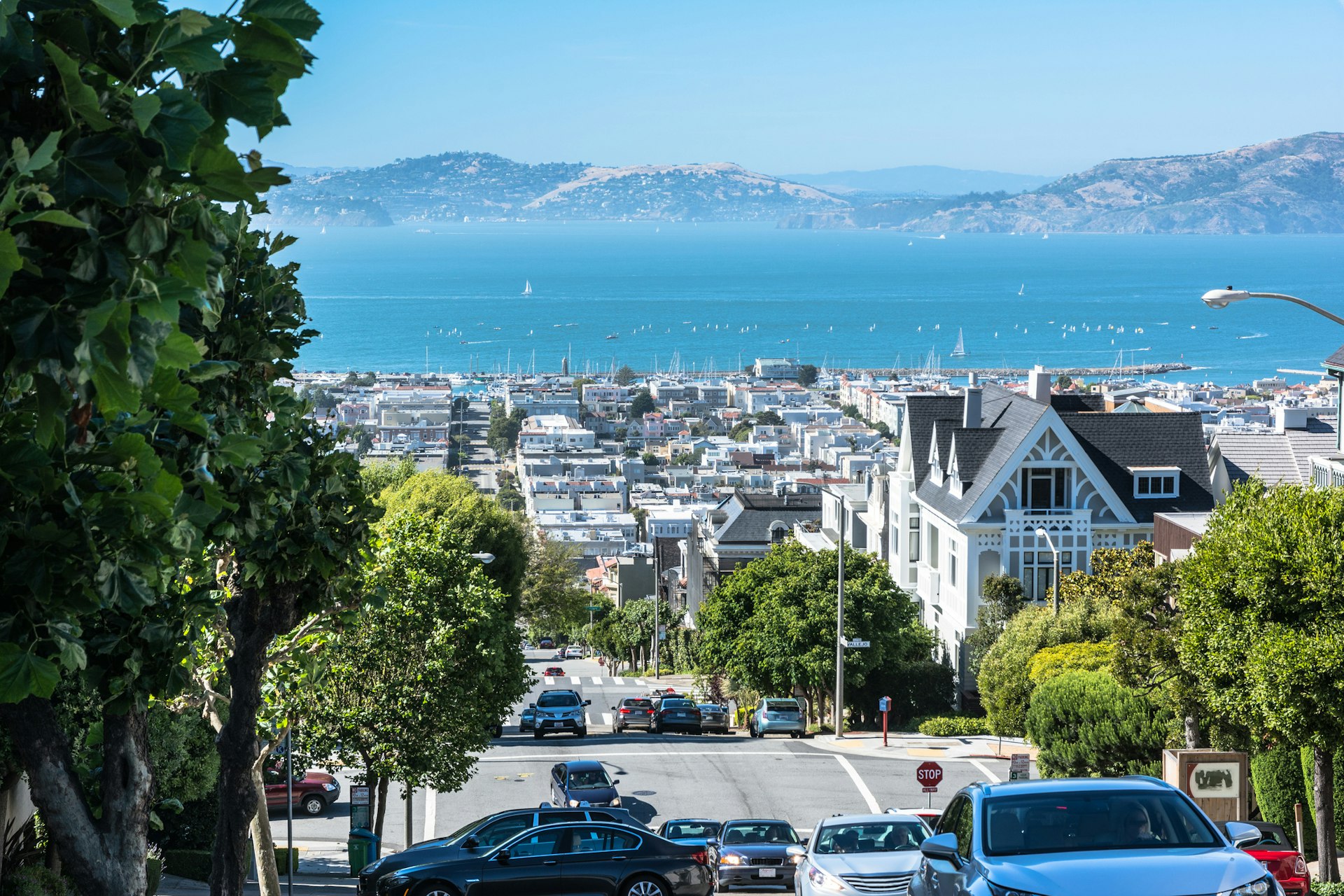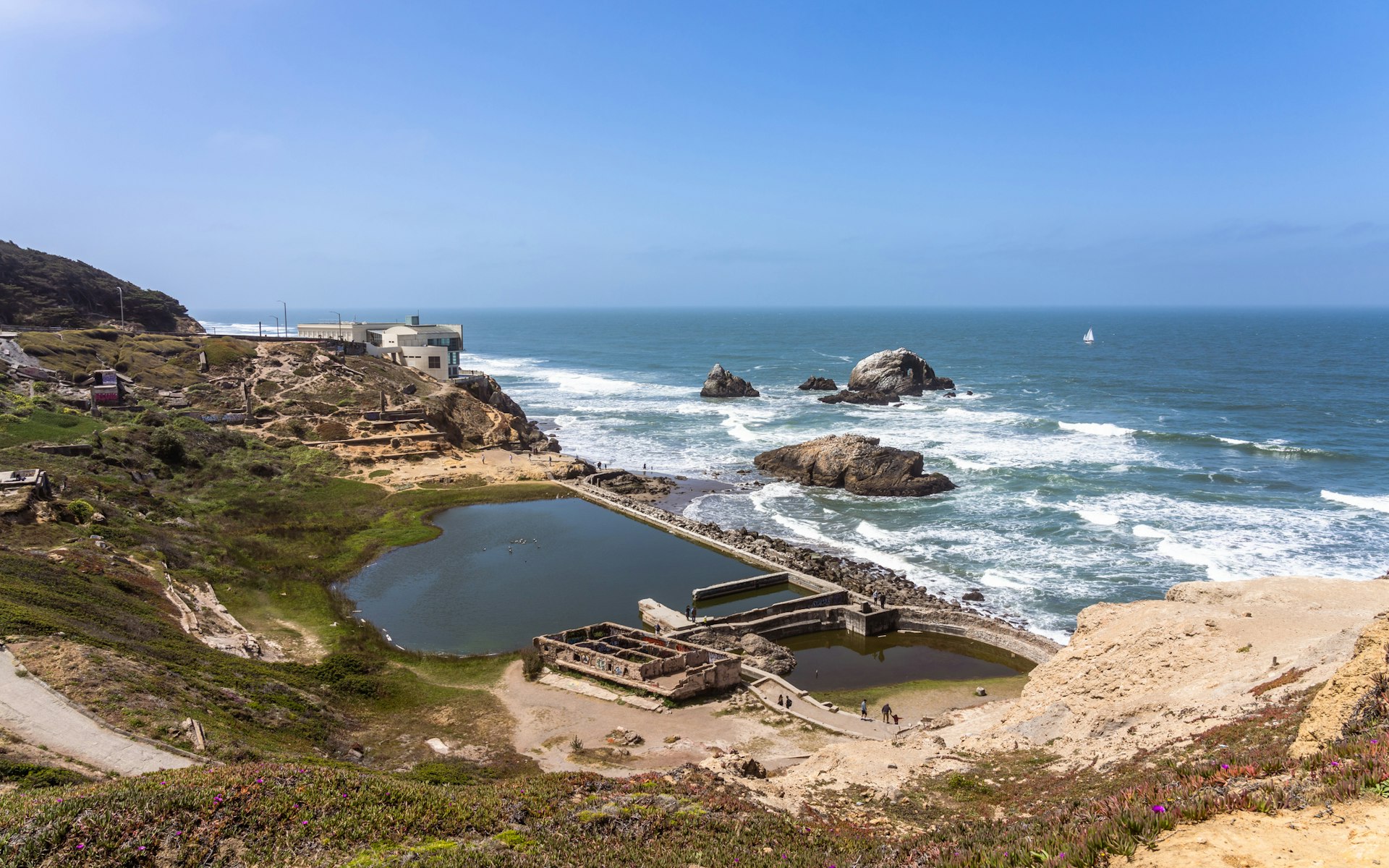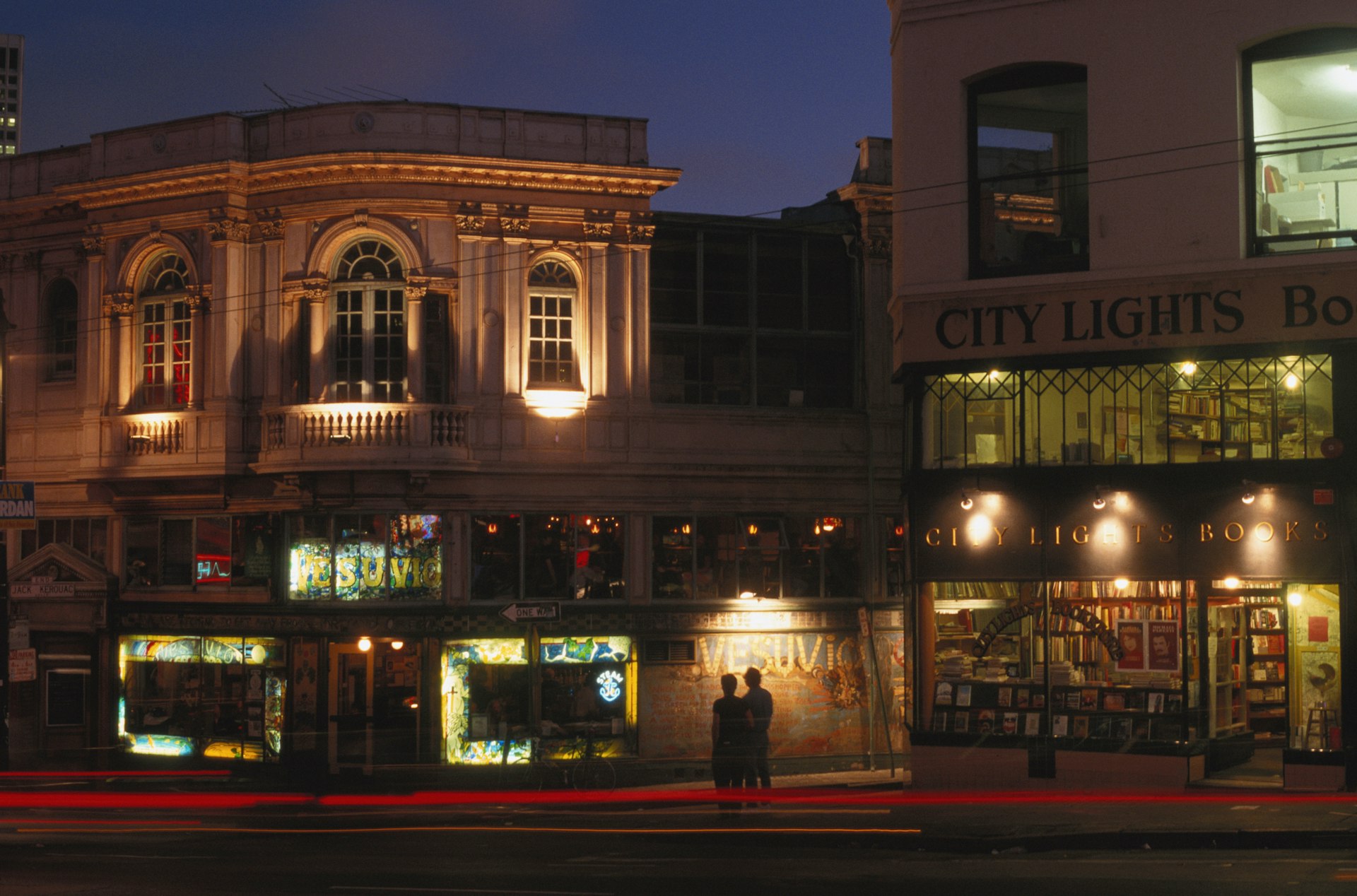It’s easy to find recommendations for typical first-time San Francisco visitor experiences.
Fisherman’s Wharf, Pier 39, Union Square, Chinatown, North Beach, Haight-Ashbury, the Castro, and Golden Gate Park are all wonderful and each has both well- and lesser-known aspects that are worth seeking out. However, the compact city still has several other neighborhoods begging to be explored, from an artificial island within city limits to attractions on the residential west side.
Here are the best neighborhoods in San Francisco to taste amazing international food, explore locals’ favorite green spaces, hit up personality-filled bars, and see what else the City by the Bay has to show for its wild west boundary-pushing spirit and welcoming, diverse communities.
1. Treasure Island
Best new neighborhood for unbeatable city skyline views
Close to the halfway point between San Francisco and Oakland is the 400-acre Treasure Island, originally created as an artificial land mass for the 1939 Golden Gate International Expo. Its role since has included being a seaplane harbor for Pan-Am airlines, and a decades-long naval base. Treasure Island became an official residential SF neighborhood in 1997.
Though peaceful and quiet at times, island living also had limited resources, with just one grocery store and often just one restaurant. That said, the view of the SF downtown skyline, especially from Avenue of the Palms is unbeatable, and the island is now in the early years of a 20-year development plan that includes housing, hotels, parks, restaurants and more. One completed aspect is the ferry that you can hop on for a fast 10-minute ride to the island (or take the trusty 25 MUNI bus from the Salesforce Transit Center downtown). More advanced bikers can also bike to TI if coming from the East Bay. An SF bike path to TI may be built in the future.
Just beyond the official TI entrance is the commanding art deco Building One, which can be seen in Netflix’s The O.A. Inside is Woods Island Club for beer, wine, and empanadas. The building also has the free Treasure Island Museum, which has artifacts from the World’s Expo and contemporary island history. Dine and play bocce ball on the Great Lawn, next to the water, at Mersea, which also houses Golden Hour Bar in collaboration with Gold Bar Whiskey, endorsed by the SF 49ers. Enjoy an outdoor fireside brunch at Aracely Cafe. For more drinking, walk to Treasure Island Wines or Treecraft Distillery. For less drinking and more activities, consider renting a paddleboard or kayak from the nonprofit Treasure Island Sailing Center. Since the island is under rapid development, check the status of places you plan to visit before heading over.
Hotels on TI are being built, so you’re currently best off in accommodations close to the Ferry Building or downtown, the easiest being both chain and boutique hotels. Prices will be higher, but you’ll also be close to other popular city attractions and neighborhoods, like Union Square.
2. Broadway and Columbus in Chinatown/North Beach
Best neighborhood to experience Chinese, Italian, Beat Generation, and red-light district history
While this area is part of well-known tourist beats, you can experience much of SF’s history within a short amount of time and minimal walking from the intersection of the hilly Broadway St and Columbus Ave, at the intersection of Chinatown, Italian and Beatnik North Beach, and the red-light district strip club area along east Broadway.
Beat poet Lawrence Ferlinghetti’s City Lights Bookstore anchors the northwest corner of the intersection, boasting three floors of progressive literature and plenty of copies of Allen Ginsberg’s Howl. Next to City Lights is Beat bar Vesuvio Cafe and the aptly named Jack Kerouac Alley. Cross east on Columbus to the The Beat Museum chock full of memorabilia, then southward to the hepcat Specs bar. Just south Specs gets into North Beach’s Italian history, with the century-old Tosca Cafe with its signature dark red leather interior and top-notch cocktails.
Further north on Columbus gets deeper into North Beach with Caffe Trieste’s espressos having fueled inquiring minds since 1956. Keep going north to Mario’s for a memorable meatball sandwich, Tony’s for some of the best pizza in SF, or Liguria Bakery for its famous focaccia. Order any of the recommended food for takeout to sit in Washington Square Park in order to people-watch and mingle with artsy old-time residents still contributing to the city’s character thanks to their rent-controlled apartments.
If resetting back at the starting intersection, walk several yards west on Broadway into Chinatown at dinnertime to eat savory soup dumplings from the reputable China Live, or a Peking duck fat-washed cocktail from the intimate Cold Drinks Bar upstairs. Slightly further west, near Stockton St, is the famed, yet casual, Yuet Lee for Cantonese seafood dishes such as crispy salt-and-pepper prawns that celebrities like Anthony Bourdain have liked. A couple blocks south is the 60-year-old Golden Gate Fortune Cookie Factory, where samples of hand-folded treats are aplenty. Cross the alley for art gallery 41 Ross to learn more about contemporary Chinatown, then 1.5 blocks east on Jackson to the revamped Great Star Theater for burlesque shows or Chinese opera performances.
If your travel group consists of all adults, venture east on Broadway from the starting intersection, where many of the city’s strip clubs go live at night — echoes of the city’s unruly Barbary Coast days. If nothing else, check out the Condor Club right on the corner. It’s the first SF strip club to gain legacy business status, and holds claim to being the first topless club in the country thanks to legendary dancer Carol Doda. If you get into the Broadway vibe, also consider Gold Club, 1 mile south on Howard between 2nd and 3rd in SoMa.
3. The Tenderloin and Little Saigon
Best neighborhood for early SF LGBTIQ+ history
The Tenderloin gets a bad rap and parts of it are rough, but it’s also a neighborhood filled with culture, delicious food, artists, cool nightlife, young families, and fierce community advocates giving the neighborhood a resilient vibrancy. With a high density of supportive housing like single-room occupancy units (SROs), and committed charity work by neighborhood organizations such as Glide, a number of people experience poverty and houselessness in the TL, some of whom may be susceptible to substance addiction and mental health crises. However, it’s generally not a safety concern for visitors, but is something to be aware of. Just use common sense when traveling through the neighborhood, wear close-toed shoes, and don’t mind the smell in some areas. Most folks on the street are minding their own business.
While first-time visitors may not want to put in volunteer orientation time at a neighborhood soup kitchen (a good way to know the neighborhood), try to attend a famous, jubilant Sunday morning service at Glide Memorial Church, regardless of your religious leanings. If another day, visit the Tenderloin Museum ($10 general admission) for a better understanding of the TL’s role in jazz, queer, immigrant, and sex worker history. If more curious but unsure, book a museum-led neighborhood walking tour ($10).
Two blocks west of the TL Museum, food is plentiful along Larkin St in Little Saigon, from a hearty $5 Saigon sandwich takeout bánh mì (cash-only) to modern Northern Vietnamese cuisine at Bodega. Eat more internationally at Yemen Kitchen for comforting lentil soup, Outta Sight Pizza for a slice of local ingredient-topped pizza from a fine dining chef, or Heart of the City Farmers Market.
Experience earlier vestiges of queer SF history by attending a drag show at the nearly 40-year-old Aunt Charlie’s Lounge, just around the corner from the former Compton’s Cafeteria and its historical 1966 uprising that predates NYC’s Stonewall. Newer jazz clubs Black Cat and Mr. Tipple’s pay tribute to the area’s jazz legacy.
Some hotels in the area are basically SROs, so research carefully. Consider the rock ’n’ roll Phoenix Hotel (which also throws legendary pool parties) on the southern end near Market St, HI San Francisco Downtown Hostel if you’re on a budget, or hotels in the neighboring Theater District or Union Square.

4. Divisadero Street
Best neighborhood for independent eating, drinking and live music venues
In a stretch of Divisadero St (or just “Divis”), running north–south from Golden Gate Ave to Page St, you can have a full, locals-heavy nightlife experience in seven straight city blocks or less on a slightly hilly incline. Divis is part of the Western Addition neighborhood, but more recently also runs along the eastern border of the newer, trendy neighborhood designation of NoPa (North of the Panhandle), coined in the aughts. Once you take a ride share to the area or MUNI bus 24, it’s easy to spend an evening eating, drinking, and being musically merry in some of the city’s best places.
From the top near Golden Gate Ave and going south, dig into Southern comfort food at Brenda’s Meat & Three, barbecue and chicharrones at the spacious 4505, or a takeout slice of bulgogi and kimchi sourdough pizza from Sunset Squares Slice Shop, then Ethiopian food, drinks, dancing and live music at the historic Club Waziema. Or center the night around a mid-size indie rock or hip-hop show at the non-corporate The Independent, first with well-executed cocktails at the Arts and Crafts movement-inspired Horsefeather, then sweaty dancing at the intimate Madrone Art Bar or relaxed drinks at The Page afterward. There are numerous itineraries to create for yourself along Divis, and all guarantee a good time.
A few boutique hotels and bed-and-breakfasts dot the neighborhood, as well as mostly Victorian AirBnBs.
5. Bernal Heights
Best low-key alternative to the Inner Mission
Bernal Heights is a tight-knit residential neighborhood that’s also chock full of personality-filled dive bars – many with quality local live music – plus excellent food to eat before or in between. Bernal is like a more laid-back outer extension of the Mission District (not to get mixed up with the actual Outer Mission neighborhood, 3 miles south on Mission St.).
The corridor of Mission Street between Cesar Chavez and 29th St in particular has the bar cluster. The scenes skew punk and hipster, but are welcoming to all. The international food options are within and beyond the cluster, in both directions. Grab a simple, hearty pasta at the whimsical Emmy’s Spaghetti Shack, beefy, saucy lomo saltado at the group-friendly Mi Lindo Perú, hard-to-find grilled nem nướng meatballs at Bac Lieu, or Detroit-style square pizza at the brewpub Cellarmaker. Then head to the cash-only, dimly lit Royal Cuckoo for organ-based bands or a quiet time on the romantic back patio, the queer-friendly El Rio for raucous backyard parties and performances, dance-worthy DJ nights at the space-themed Mothership, or The Knockout for a punk show and boilermaker.
If going a bit south on Mission, preface the night with a visit to the punk-leaning Thrillhouse Records and eat the original SF Indian pizza at Zante. If going a bit north of the dive bar cluster, enjoy pillowy pita and a strong Turkish coffee at the family-owned Old Jerusalem. Either way, also consider going two blocks west of the strip (5-minute walk) to local favorite Mitchell’s Ice Cream, which is open until 11:00 p.m. and is known for its Asian flavors like macapuno (don’t forget to grab a number near the entrance).
As Bernal Heights is residential, accommodations will skew toward vacation rentals like those on AirBnB, though also consider the bed-and-breakfast Noe’s Nest half a mile north.

6. The Sunset and The Richmond
Best neighborhoods for Asian food
While San Francisco is a small 49 sq miles, many transplants and visitors hesitate to travel “far” to the largely residential westside. However, the ocean-bearing half of SF has gold mines of casual Asian and other international eateries, and more worthy green spaces to explore that give a deeper understanding of the city. Major westside neighborhoods include The Sunset that lies below GGP, and The Richmond that lies above the park. Both have inner and outer sections separated by the busy north–south running 19th Ave. While containing a diversity of Asian and other ethnicities, Clement St in The Richmond is known as the city’s second Chinatown. Irving St in The Sunset could also be considered a third one. Western Neighborhoods Project and the Chinese Historical Society of America even recently created exhibits about Chinese in The Sunset and The Richmond – solidifying long-known local knowledge about the bustling communities and its tourism-worthy resources.
While there are several pockets of deliciousness, Clement Street eats include the cash-only, takeout Good Luck Dim Sum, Chinese and other Asian groceries galore at New May Wah Supermarket, century-old Schubert’s German bakery, and pioneering Burma Superstar for tea leaf salad. Going south to Noriega reveals more food clusters, especially between 19th and 33rd Aves including top Hong Kong diner Cafe Bakery, Chinese-Vietnamese-Cambodian noodle house Thai Nghiep Ky Mi Gia, and real-deal Cantonese barbecued meats from Cheung Hing. In The Sunset, the food intersection around 19th Ave and Irving St is a classic. Chomp down on five-spice chicken garlic noodles at PPQ Beef Noodle House, giant beef rib pho at Gao Viet Kitchen, and flaky-topped, butter-filled Hong Kong pineapple buns from Pineapple King.
Work off the abundant eats by also visiting some westside green spaces. The upper Outer Richmond houses the rocky, wild Lands End for easy-to-moderate hiking, plus vestiges of old San Francisco like Sutro Baths and the Camera Obscura. Take a long walk along windy Ocean Beach, or settle down by a beach fire pit during burn season. Close to the Noriega food strip are the mosaic-covered 16th Ave Tiled Steps and its related Hidden Garden Steps nearby. Some of the westside attractions are also part of the new-ish citywide Crosstown Trail that spans the city from the southeast to the northwest.
Accommodations include a handful of beachside motels along Ocean Beach, though visitors wanting more updated accommodations should consider vacation rentals via VRBO, AirBnB, and similar booking sites.
7. Bayview-Hunters Point (BVHP)
Best neighborhood for Black-owned businesses
Bayview-Hunters Point is an oft-ignored part of SF, tucked away in the southeastern corner of the city. The Hunters Point Shipyard once boomed during WWII, providing job opportunities for many Black families during The Great Migration. Post-war decline of the yard and the US Navy’s leftover toxic waste left the area less desirable and hazardous to residents’ health. That said, there have been environmental clean-up and revitalization efforts.
The 3rd St business corridor, part of the SF African American Arts and Culture District, ranges from the historic Bayview Opera House to Tallio’s new wave coffee to equity cannabis program dispensary CDXX. The district also sponsors community programming from block parties to mural unveilings, the latter of which you can see along 3rd St and other parts of BVHP.
Pop over to Quesada Ave off 3rd to see ground zero of the Quesada Gardens Initiative – a resident-led community gardens effort created in 2002 to combat the historically down-and-out area that still thrives today. Take brunch at Cafe Envy to indulge in the famous fried chicken and waffles, a menu item brought over from popular (but now-closed) sister restaurant Auntie April’s. Further north on 3rd is a new Thursday farmers market with an emphasis on local Black vendors, sponsored by food justice nonprofit Dragonspunk. If it’s later, take dinner at jazz-themed supper club Old Skool Cafe, run by local at-risk youth.
Another area of BVHP to visit is the old shipyard, which now houses Hunters Point Shipyard Artists and whose studios open to the public on a regular basis. Walk one block northwest on Innes Ave (bordering the India Basin neighborhood) to have a sauna session and rooftop cafe wind-down at the locally well-known Archimedes Banya Russian bathhouse, then feel reenergized to climb the 87 Flights of Fancy (or Arelious Walker) tiled steps a few yards away.
Also nearby is Posh Green, described as “the Nordstrom of dispensaries,” and is the first SF weed dispensary independently owned by a woman of color. Cafe Alma is just steps away, serves house-baked granola and food from local vendors like Camisha’s Cakes. Cross the street to peep at the historic Albion Castle. Otherwise, hop to India Basin Waterfront Park a 5-minute walk north for a brief shoreline walk that previews what further development plans look like. Farther north along Evans Ave is Speakeasy Ales & Lagers taproom, where you can get a barrel-aged stout blend or its classic Prohibition Ale.
The neighborhood and those around it tend to house multigenerational families with several cars per household – parking can be hard. Consider staying downtown close to the MUNI metro T line that travels directly into Bayview along 3rd St. There are a handful of vacation rentals in the neighborhood, but expand your options by also considering the nearby Dogpatch to the north.
